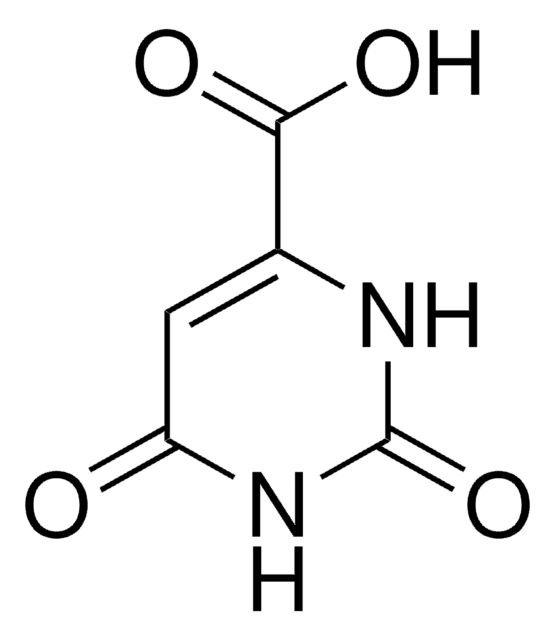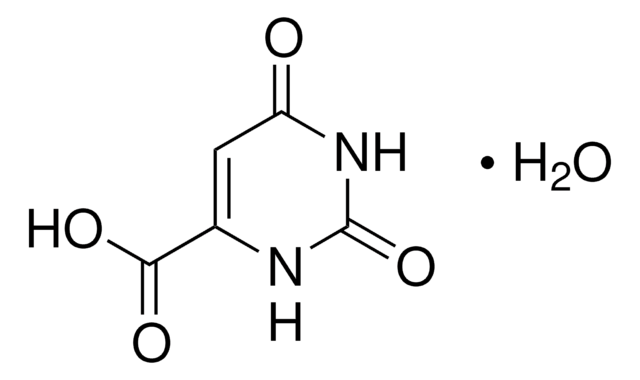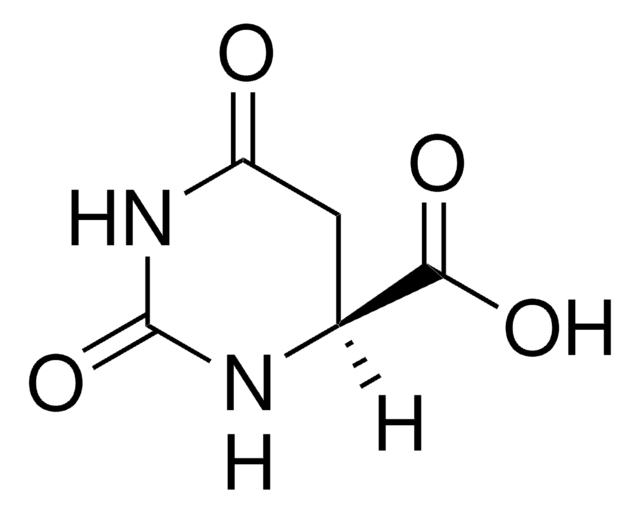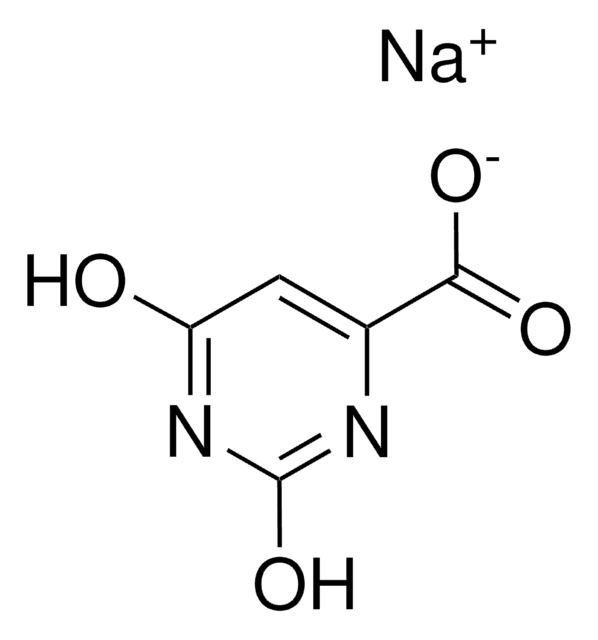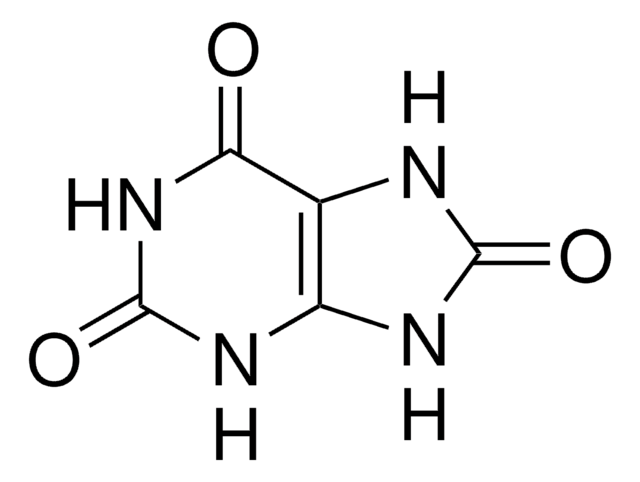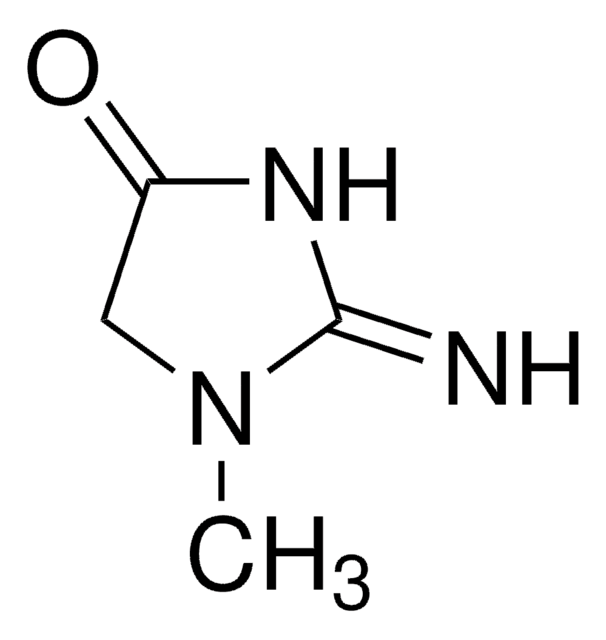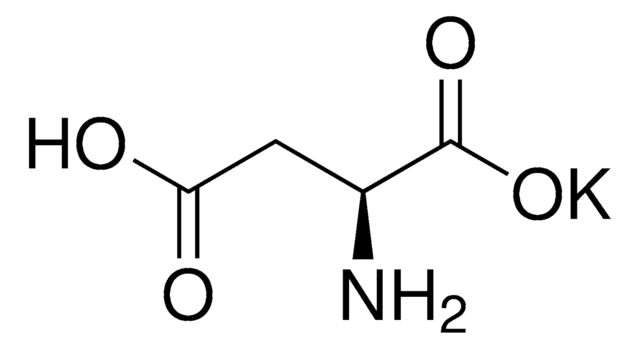O2875
Orotic acid potassium salt
≥98%
Sinónimos:
6-Carboxy-2,4-dihydroxypyrimidine, Uracil-6-carboxylic acid
Iniciar sesiónpara Ver la Fijación de precios por contrato y de la organización
About This Item
Fórmula lineal:
C5H3N2O4K
Número de CAS:
Peso molecular:
194.19
EC Number:
MDL number:
UNSPSC Code:
41106305
PubChem Substance ID:
NACRES:
NA.51
Productos recomendados
Quality Level
assay
≥98%
form
powder
solubility
1 M NaOH: 25 mg/mL, clear to slightly hazy, colorless to faintly yellow
SMILES string
[K+].[O-]C(=O)C1=CC(=O)NC(=O)N1
InChI
1S/C5H4N2O4.K/c8-3-1-2(4(9)10)6-5(11)7-3;/h1H,(H,9,10)(H2,6,7,8,11);/q;+1/p-1
InChI key
DHBUISJCVRMTAZ-UHFFFAOYSA-M
Application
Orotic acid (OA) is an intermediate in de novo pyrimidine biosynthesis that may be used to study the specificity and kinetics of orotate phosphoribosyltransferase (OPRT) which catalyzes the reversible phosphoribosyl transfer from 5′-phospho-α-d-ribose 1′-diphosphate (PRPP) to orotic acid (OA), forming pyrophosphate and orotidine 5′-monophosphate (OMP). Orotic acid is used as a starting material for the potential commercial bioproduction of uridine 5′-monophosphate (UMP) by microbes such as Corynebacterium ammoniagenes (ATCC 6872) or Saccharomyces cerevisiae. OA may be used to study the AMPK/SREBP-1 dependent cell signaling pathway and transcription regulation mechanisms that induce hepatic lipogenesis.
Storage Class
11 - Combustible Solids
wgk_germany
WGK 2
flash_point_f
Not applicable
flash_point_c
Not applicable
ppe
Eyeshields, Gloves, type N95 (US)
Elija entre una de las versiones más recientes:
¿Ya tiene este producto?
Encuentre la documentación para los productos que ha comprado recientemente en la Biblioteca de documentos.
Los clientes también vieron
Enhanced uridine 5'-monophosphate production by whole cell of Saccharomyces cerevisiae through rational redistribution of metabolic flux.
Liu D, Chen Y, Li A, Xie J, Xiong J, et al.
Bioprocess and Biosystems Engineering (2011)
Ardala Breda et al.
Molecular bioSystems, 8(2), 572-586 (2011-11-15)
Tuberculosis (TB) is a chronic infectious disease caused mainly by Mycobacterium tuberculosis. The worldwide emergence of drug-resistant strains, the increasing number of infected patients among immune compromised populations, and the large number of latent infected individuals that are reservoir to
Xing Wang et al.
Applied microbiology and biotechnology, 76(2), 321-328 (2007-05-24)
Attempts were made with success to develop a two-step biocatalytic process for uridine 5'-monophosphate (UMP) production from orotic acid by Corynebacterium ammoniagenes ATCC 6872: the strain was first cultivated in a high salt mineral medium, and then cells were harvested
Yong Chen et al.
Applied microbiology and biotechnology, 86(1), 75-81 (2009-10-15)
A whole cell biocatalytic process for uridine 5'-monophosphate (UMP) production from orotic acid by Saccharomyces cerevisiae was developed. The concentration of UMP was increased by 23% when 1 g l(-1) sodium citrate was fed into the broth. Effects of citrate
Eun-Jeong Jung et al.
Journal of lipid research, 52(9), 1617-1625 (2011-07-16)
Orotic acid (OA), an intermediate in pyrimidine metabolism, has been used for a variety of purposes, such as dietary supplements. Although it is well documented that OA induces fatty liver in a species-specific manner, the precise molecular mechanisms remain unclear.
Nuestro equipo de científicos tiene experiencia en todas las áreas de investigación: Ciencias de la vida, Ciencia de los materiales, Síntesis química, Cromatografía, Analítica y muchas otras.
Póngase en contacto con el Servicio técnico